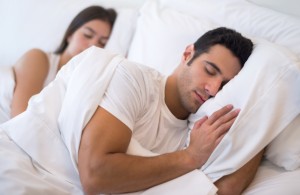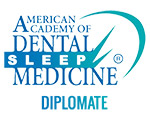
Sleep apnea is a common, but serious, sleep disorder affecting more than 18 million American adults, according to statistics from the National Sleep Foundation. More than a noisy annoyance, snoring and the cessation of breathing multiple times a night arelinked to health issues that compromise longevity and daily well-being. Dr. Donald Marks, State College, PA dentist, offers sleep apnea solutions for better rest and health, too.
What causes sleep apnea?
Basically, there are 3 kinds of sleep apnea. One is Obstructive Sleep Apnea. OSA comes from the relaxation of the soft tissues at the back of the throat. These tissues block the airway and stop breathing up to 100 times or more per night. Individuals startle awake, gasping for air.
The same scenario happens with Central Sleep Apnea, or CSA, but the causation originates in the brain as it fails to send a signal to the respiratory system to take a breath. CSA combined with OSA results in Mixed Sleep Apnea which, as the name indicates, has features of both OSA and CSA.
While sleep apnea occurs in people of all ages, socioeconomic backgrounds and genders, doctors and dentists find some pre-disposing factors such as:
- Obesity
- Thick neck circumference
- Smoking
- Alcohol abuse
- Heredity
- Age over 40
- Being male
- Small jaw structure
- Pronounced overbite
- Sinus and allergy problems
Why it’s dangerous
Dr. Marks and other dentists and primary care physicians worry about sleep apnea because of its links to serious health issues such as:
- Diabetes
- Hypertension
- Depression
- Attention and memory problems
- Insomnia
- Cardiac arrhythmias
- Daytime sleepiness
While some simple strategies such as sleeping on one’s side may help, a better plan is a frank talk with your primary care physician. He or she may recommend an at-home or in-office sleep study with a trained sleep specialist. With a correct diagnosis, proper interventions remedy the issue for better sleep and better health.
Best interventions
The most severe sleep apnea problems may need surgery to modify the soft tissues of the mouth, or some people benefit from wearing a CPAP mask while sleeping. CPAP, or Continuous Positive Airway Pressure, forces a stream of air into the throat, keeping the airway open. Some individuals do well with CPAP while others struggle with its noise or with having to wear an appliance on the face all night.
For mild to moderate sleep apnea, Dr. Donald Marks offers a custom-made acrylic mouthpiece. Similar to an athletic mouthguard in appearance, a “snore guard” forces the lower jaw forward, opening the airway. Worn during the night and during daytime naps, too, a snore guard alleviates the obstruction common to sleep apnea and stops its most disturbing symptoms.
You could stop snoring
If you think you suffer with sleep apnea, or your spouse believes you do, contact Donald Marks Family Dentistry. Come to the State College, PA office for a consultation on snoring and sleep apnea care. You can get a healthful night’s rest!




